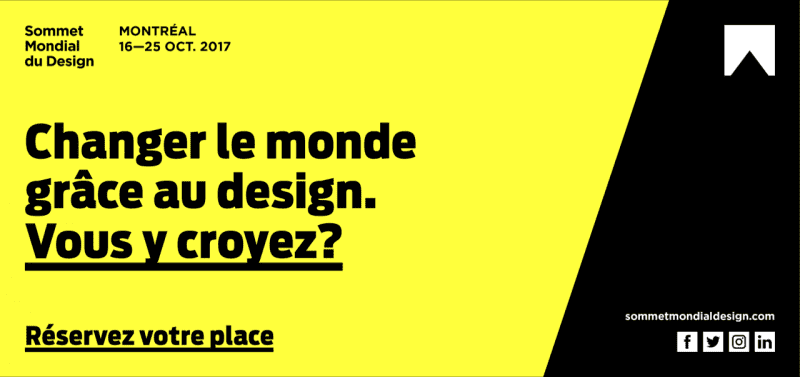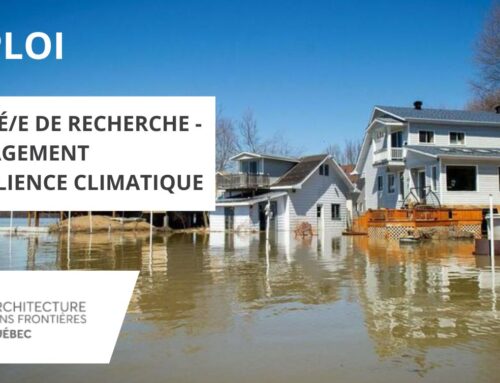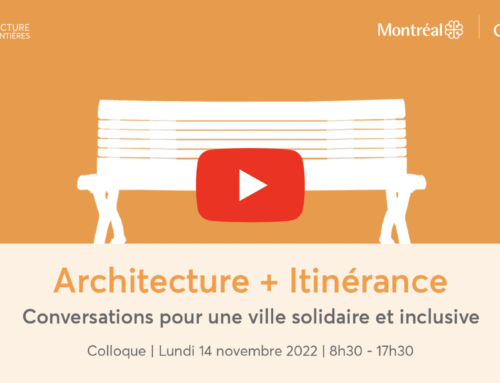Conférences – L’architecture humanitaire à l’honneur au Sommet mondial du design
Serez-vous des nôtres au Sommet mondial du design qui aura lieu au Palais des congrès de Montréal la semaine prochaine? Les Architectes de l’urgence et de la coopération (AUC) seront sur place! À titre de membre du réseau Architecture Sans Frontières International, AUC participera aux délibérations qui conduiront à la signature de la première déclaration mondiale du design. L’organisation fera aussi rayonner l’architecture humanitaire avec un panel international qui traitera de la question, ainsi qu’avec une conférence sur le design au service des réfugiés.
Cliquez ici pour vous inscrire à la partie “Congrès” du Sommet mondial du design, du 16 au 20 octobre 2017.
DATE : 18 octobre, 8:30, salle 513c
ÉNONCÉ : In front of the great inequality between those who can afford a well designed built environment and those who cannot, humanitarian architecture is crucial to address the global sustainable habitat issue in a fully equitable manner.
DESCRIPTION : As population growth, migration, urbanization, disasters and climate change tend to accelerate and combine their impacts, so do problems related to settling, housing and infrastructures. This is especially true in disadvantaged communities and informal settlements – be them rural or urban, more in the South but increasingly in the North – in which the absence of an adequate habitat prevents citizens from fully exercising their most basic human rights, as access to healthcare, education and resilient housing. There lies the great inequality between those who can afford a well designed built environment and those who cannot.In this context, a growing number of humanitarian organisations and designers – be them architects, landscape architects, urban planners or other design professionals – work to fill that gap and stand on the front line with populations in urgent need of appropriate design interventions. But how should they cooperate with local populations? Following which ethical standards? How can they intervene consistently with local traditions and heritage? And how can design NGOs and non-design NGOs, big or small, can better collaborate to increase their efficiency? This session is organized by Architecture Sans Frontières International (ASF Int), a network of local design NGOs collaborating, since more than a decade, in order to exchange experiences, share resources and work together at a global level. In this same spirit, ASF Int here invites around the table representatives of four other organisations concerned by international cooperation and the social production of habitat: the International Federation of Housing and Planning and Landscapes Architects Without Borders (a committee of the International Federation of Landscape Architects). Together, they will discuss humanitarian design as a key sector to address this global sustainability issue in an equitable manner, in line with new international roadmaps provided by the SDGs, the NUA and the Paris Agreement. After briefly presenting the work of their organisation, panelists will each make their case for the crucial role humanitarian designers have to play to change the world and will highlight the opportunities they foresee as the first World Design Declaration is about to be adopted.
INTERVENANTS :
- Xavier Codina, président d’ASF International
- Regitze Marianne Hess, special advisor of IFHP
- Maria Gabriella Trovato, Landscape Architects Without Borders
- Bruno Demers, directeur d’AUC
PRÉSENTÉ PAR : Architecture sans frontières international

CONFÉRENCE : Je veux jouer en Syrie : le design au service des enfants réfugiés en contexte de crise humanitaire
DATE : 19 octobre, 10:30, salle 511a
ÉNONCÉ : Au coeur d’une crise humanitaire où la guerre prend tout sur son passage, le design a le pouvoir, par le jeu, de redonner une enfance aux enfants et un sens à la vie de toute une communauté.
DESCRIPTION : La Syrie est frappée depuis 2011 par un conflit qui a déjà fait plus de 400 000 morts, 7 millions de déplacés et 4 millions de réfugiés dans les pays voisins, surtout des femmes, qui ont tout perdu, et des enfants, qui ne sont pas allés à l’école depuis des mois, voire des années. Comment le design peut-il redonner un sens à la vie et à l’enfance au coeur du drame, considérant que beaucoup d’enfants naitront, grandiront et passeront plus d’une quinzaine d’années dans des camps de réfugiés? Par le jeu, rien de moins. Car le jeu est universel et sans frontières. En plus d’être un droit des enfants et d’offrir un espace thérapeutique, il est au fondement d’un développement psycho-moteur, social et éducatif complet. C’est sur la base de cette prémisse que la Fondation Je veux jouer a amorcé en 2016 des interventions ludiques dans les camps de réfugiés syrien, en commençant par ceux d’Atmeh et d’Ariha, où des parcs à jeux ont été érigés. Avec l’aide des Architectes de l’urgence et de la coopération, la Fondation Je veux jouer a aussi procédé a un processus de conception ayant mobilisé en amont l’expertise de spécialistes de la psychologie de l’enfance, de l’ergothérapie, du jeu et du design de l’environnement pour produire un programme fonctionnel capable d’optimiser le potentiel du jeu comme facteur de résilience. En décrivant les projets réalisés et à venir, la présentation insistera sur les résultats observés sur le terrain et le potentiel reproductible de tels aménagements ludiques, capable de transformer des vies. Celles des enfants comme celle de toute leur communauté.
INTERVENTANT : Luc Gauvin, architecte et VP d’AUC
PRÉSENTÉ PAR : AUC







